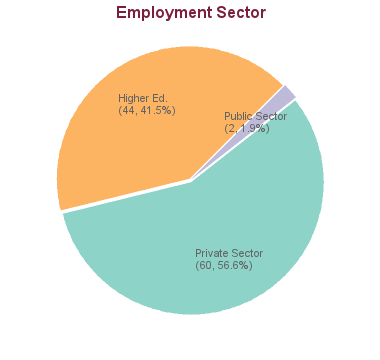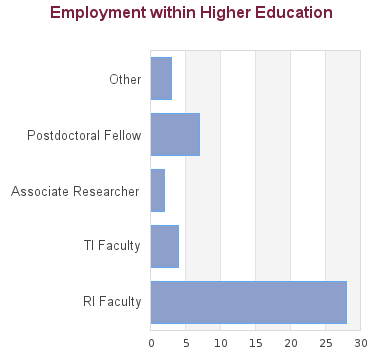
Barry Po
Job Title
Senior Director, Product & Business Development
Employer
NGRAIN

Review details about the recently announced changes to study and work permits that apply to master’s and doctoral degree students. Read more
PhD students in the Department of Computer Science may focus their research in the following areas:
The UBC Department of Computer Science has many contacts in the computing industry. A strong rapport between the industry and research communities is beneficial to both, especially in cases where the department focuses its research to developing real-world applications.
The Faculty of Graduate and Postdoctoral Studies establishes the minimum admission requirements common to all applicants, usually a minimum overall average in the B+ range (76% at UBC). The graduate program that you are applying to may have additional requirements. Please review the specific requirements for applicants with credentials from institutions in:
Each program may set higher academic minimum requirements. Please review the program website carefully to understand the program requirements. Meeting the minimum requirements does not guarantee admission as it is a competitive process.
Applicants from a university outside Canada in which English is not the primary language of instruction must provide results of an English language proficiency examination as part of their application. Tests must have been taken within the last 24 months at the time of submission of your application.
Minimum requirements for the two most common English language proficiency tests to apply to this program are listed below:
Overall score requirement: 100
Reading
22
Writing
21
Speaking
21
Listening
22
Overall score requirement: 7.0
Reading
6.5
Writing
6.5
Speaking
6.5
Listening
6.5
Some programs require additional test scores such as the Graduate Record Examination (GRE) or the Graduate Management Test (GMAT). The requirements for this program are:
The GRE is not required.
All applicants have to submit transcripts from all past post-secondary study. Document submission requirements depend on whether your institution of study is within Canada or outside of Canada.
A minimum of three references are required for application to graduate programs at UBC. References should be requested from individuals who are prepared to provide a report on your academic ability and qualifications.
Many programs require a statement of interest, sometimes called a "statement of intent", "description of research interests" or something similar.
Students in research-based programs usually require a faculty member to function as their thesis supervisor. Please follow the instructions provided by each program whether applicants should contact faculty members.
Permanent Residents of Canada must provide a clear photocopy of both sides of the Permanent Resident card.
All applicants must complete an online application form and pay the application fee to be considered for admission to UBC.
| Fees | Canadian Citizen / Permanent Resident / Refugee / Diplomat | International |
|---|---|---|
| Application Fee | $116.25 | $168.25 |
| Tuition * | ||
| Installments per year | 3 | 3 |
| Tuition per installment | $1,875.34 | $3,294.66 |
| Tuition per year (plus annual increase, usually 2%-5%) | $5,626.02 | $9,883.98 |
| Int. Tuition Award (ITA) per year (if eligible) | $3,200.00 (-) | |
| Other Fees and Costs | ||
| Student Fees (yearly) | $1,144.10 (approx.) | |
| Costs of living | Estimate your costs of living with our interactive tool in order to start developing a financial plan for your graduate studies. | |
Applicants to UBC have access to a variety of funding options, including merit-based (i.e. based on your academic performance) and need-based (i.e. based on your financial situation) opportunities.
All full-time PhD students will be provided with a funding package of at least $33,612 for each of the first four years of their PhD program. The funding package consists of any combination of internal or external awards, teaching-related work, research assistantships, and graduate academic assistantships. This support is contingent on full-time registration as a UBC Graduate student, satisfactory performance in assigned teaching and research assistantship duties, and good standing with satisfactory progress in your academic performance. CS students are expected to apply for fellowships or scholarship to which they are eligible.
All applicants are encouraged to review the awards listing to identify potential opportunities to fund their graduate education. The database lists merit-based scholarships and awards and allows for filtering by various criteria, such as domestic vs. international or degree level.
Many professors are able to provide Research Assistantships (GRA) from their research grants to support full-time graduate students studying under their supervision. The duties constitute part of the student's graduate degree requirements. A Graduate Research Assistantship is considered a form of fellowship for a period of graduate study and is therefore not covered by a collective agreement. Stipends vary widely, and are dependent on the field of study and the type of research grant from which the assistantship is being funded.
Graduate programs may have Teaching Assistantships available for registered full-time graduate students. Full teaching assistantships involve 12 hours work per week in preparation, lecturing, or laboratory instruction although many graduate programs offer partial TA appointments at less than 12 hours per week. Teaching assistantship rates are set by collective bargaining between the University and the Teaching Assistants' Union.
Academic Assistantships are employment opportunities to perform work that is relevant to the university or to an individual faculty member, but not to support the student’s graduate research and thesis. Wages are considered regular earnings and when paid monthly, include vacation pay.
Canadian and US applicants may qualify for governmental loans to finance their studies. Please review eligibility and types of loans.
All students may be able to access private sector or bank loans.
Many foreign governments provide support to their citizens in pursuing education abroad. International applicants should check the various governmental resources in their home country, such as the Department of Education, for available scholarships.
The possibility to pursue work to supplement income may depend on the demands the program has on students. It should be carefully weighed if work leads to prolonged program durations or whether work placements can be meaningfully embedded into a program.
International students enrolled as full-time students with a valid study permit can work on campus for unlimited hours and work off-campus for no more than 24 hours a week during academic sessions.
A good starting point to explore student jobs is the UBC Work Learn program or a Co-Op placement.
Students with taxable income in Canada may be able to claim federal or provincial tax credits.
Canadian residents with RRSP accounts may be able to use the Lifelong Learning Plan (LLP) which allows students to withdraw amounts from their registered retirement savings plan (RRSPs) to finance full-time training or education for themselves or their partner.
Please review Filing taxes in Canada on the student services website for more information.
Applicants have access to the cost estimator to develop a financial plan that takes into account various income sources and expenses.
111 students graduated between 2005 and 2013. Of these, career information was obtained for 106 alumni (based on research conducted between Feb-May 2016):


Our faculty and students actively interact with industry in numerous fields. Via internships, consulting and the launching of new companies, they contribute to the state-of-the-art in environmental monitoring, energy prediction, software, cloud computing, search engines, social networks, advertising, e-commerce, electronic trading, entertainment games, special effects in movies, robotics, bioinformatics, biomedical engineering, and more.
These statistics show data for the Doctor of Philosophy in Computer Science (PhD). Data are separated for each degree program combination. You may view data for other degree options in the respective program profile.
| 2023 | 2022 | 2021 | 2020 | 2019 | |
|---|---|---|---|---|---|
| Applications | 281 | 265 | 375 | 299 | 278 |
| Offers | 31 | 40 | 41 | 45 | 26 |
| New Registrations | 14 | 15 | 20 | 20 | 16 |
| Total Enrolment | 129 | 124 | 116 | 98 | 81 |
Students in research-based programs usually require a faculty member to function as their thesis supervisor. Please follow the instructions provided by each program whether applicants should contact faculty members.
These videos contain some general advice from faculty across UBC on finding and reaching out to a supervisor. They are not program specific.
| Year | Citation |
|---|---|
| 2022 | Dr. Kianzad studied the design and evaluation of a robotic stylus -called MagicPen. He investigated how force feedback can enable learners to fluidly express their ideas during hand sketching tasks, and explored the benefits of using the sense of touch in learning. His work highlights the role of haptics in future objects-to-think-with. |
| 2022 | Dr. Bevilacqua developed efficient algorithms for estimating and optimizing reachability and coverage on probabilistic graphs. Many real networks such as protein-protein interaction networks, peer-to-peer computer networks and online social networks exhibit uncertainty which may be modelled as a probabilistic graph. |
| 2022 | Dr. Banerjee proposed a model that combines utility-driven item adoption with the viral network effect helping to propagate adoption of and desire for items from users to their peers. He subsequently applied the model to study influence maximization and filter bubble problem. |
| 2022 | Dr. Rosales developed a novel surfacing algorithm to convert raw VR drawings into usable 3D models. He also created a new VR brush that increases the number of shapes that can be comfortably drawn. This research expands the range of applications of VR drawings and makes VR drawing a practical alternative to 3D modeling for inexperienced users. |
| 2022 | Dr. Xie developed algorithms and systems to control legged robot to move intelligently in challenging situations. His research brings us closer to having intelligent robots in our daily life. |
| 2021 | Dr. Kodirov explored offering network bandwidth guarantees as a first class cloud service. He developed efficient algorithms to schedule datacenter network bandwidth, and proposed a methodology for their evaluation in a realistic environment. He also built a prototype, and demonstrated that it is feasible to price bandwidth in a competitive manner. |
| 2021 | Information visualization helps us to explore, analyze and communicate data. Dr. Oppermann studied the use of real-world data in visualization prototyping. He contributed tools, techniques, and guidelines for visualizing indoor spatial data and time-oriented data. He improved recommendations and compact previews for Tableau visualization workbooks. |
| 2021 | Dr. Fang studied first-order optimization algorithms. His work has contributed to a better understanding of first-order methods for structured problems. |
| 2021 | Many of the artificial-intelligence-powered products that we use daily rely on a family of methods called "deep learning"'. Dr. Shafaei presented solutions that enable a broader and safer application of these techniques. He also introduced a new application of deep learning for automated portrait editing that produces high-quality images. |
| 2021 | Dr. Zolaktaf studied ways to improve the prediction of nucleic acid kinetics. This study provides more efficient computational methods for predicting nucleic acid kinetics and improving the underlying kinetic models for nucleic acids. Her contributions will make it easier to design nucleic-acid based devices, such as DNA robots. |
Computer Science covers Bayesian statistics and applications, bioinformatics, computational intelligence (computational vision, automated reasoning, multi-agent systems, intelligent interfaces, and machine learning), computer communications, databases, distributed and parallel systems, empirical analysis of algorithms, computer graphics, human-computer interaction, hybrid systems, integrated systems design, networks, network security, networking and multimedia, numerical methods and geometry in computer graphics, operating systems, programming languages, robotics, scientific computation, software engineering, visualization, and theoretical aspects of computer science (computational complexity, computational geometry, analysis of complex graphs, and parallel processing).
Departments/Programs may update graduate degree program details through the Faculty & Staff portal. To update contact details for application inquiries, please use this form.

Take a break from studying with opportunities at your fingertips. Whether you want to settle down in a café or take your research outdoors, we have a place for you.